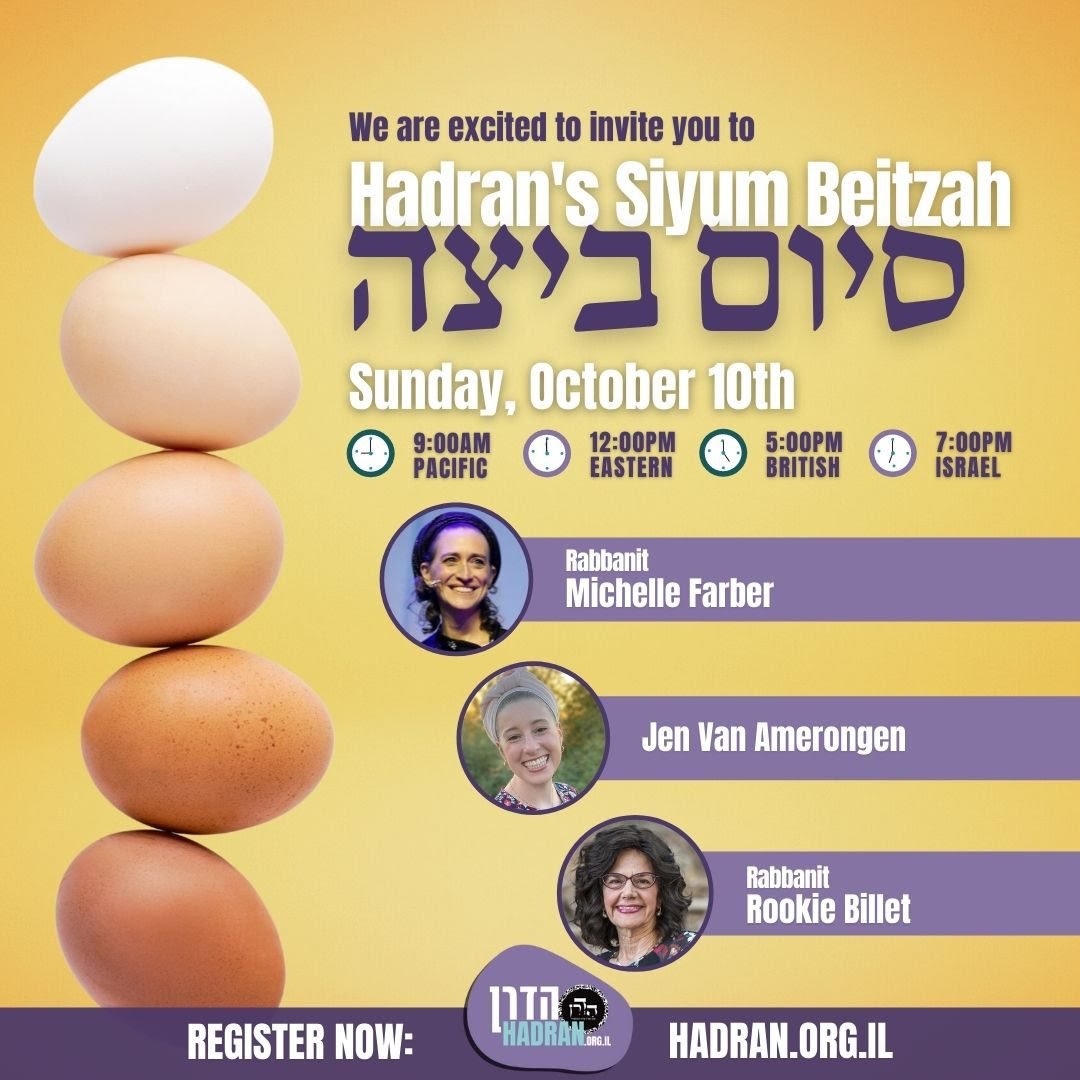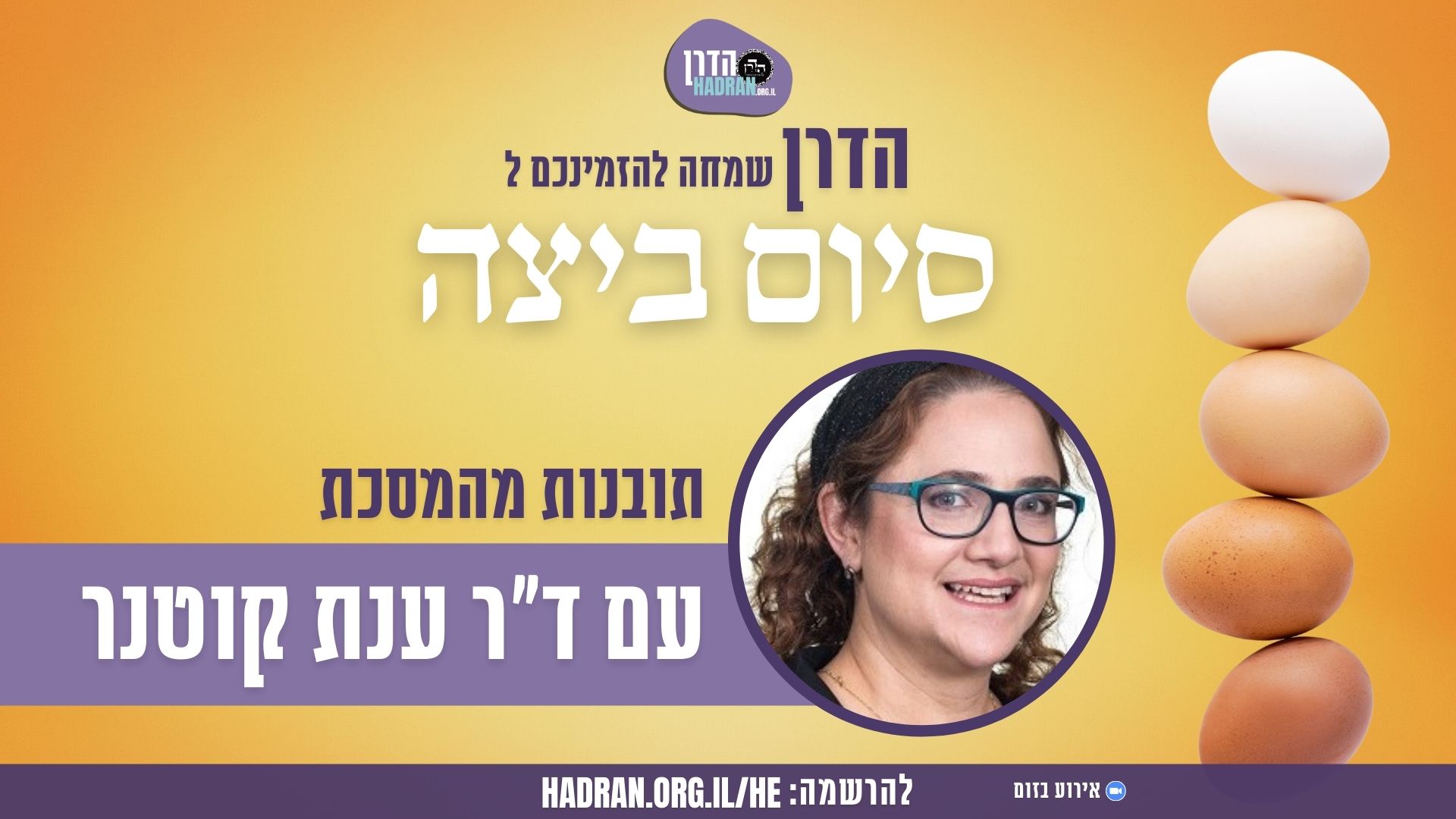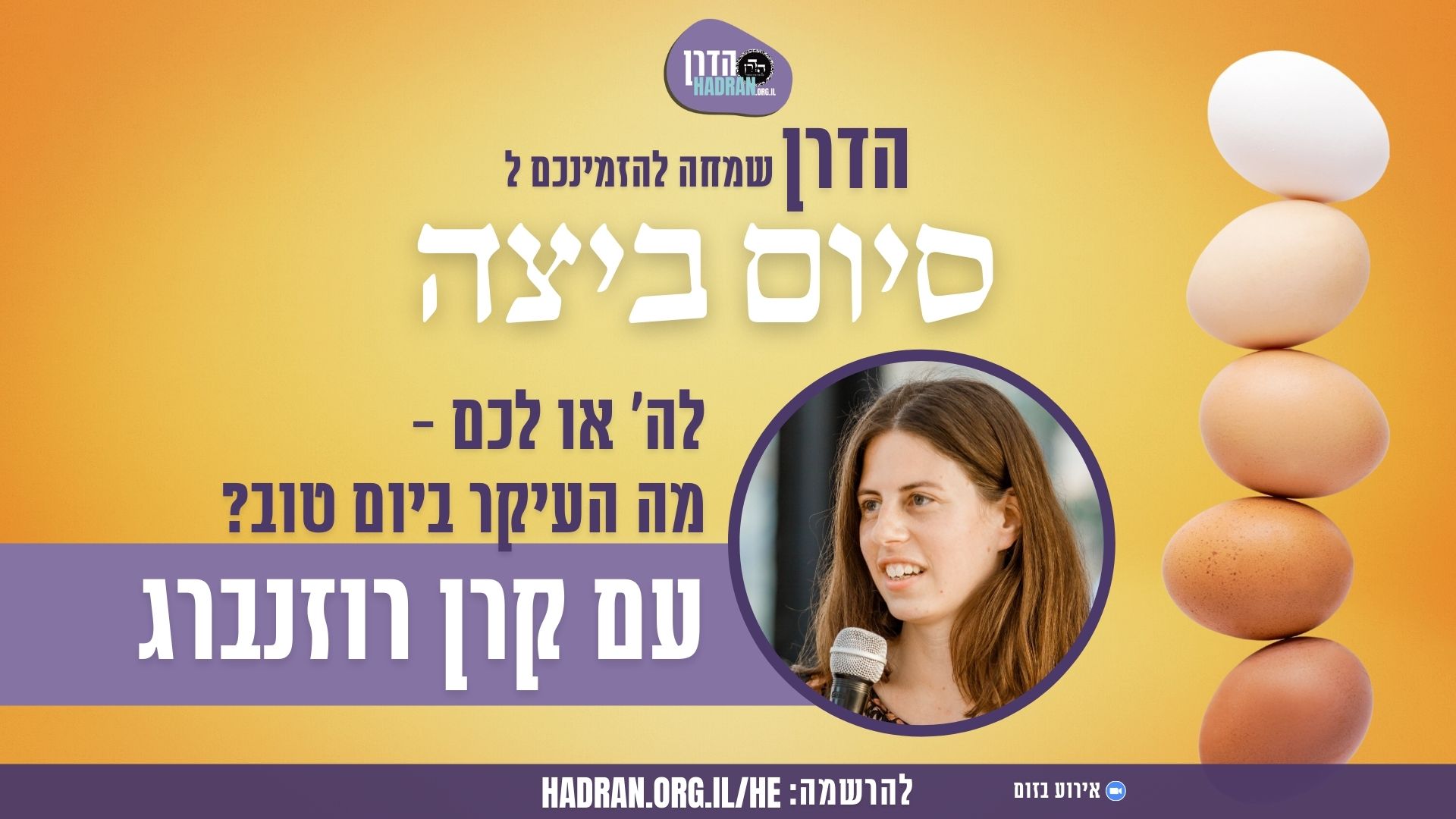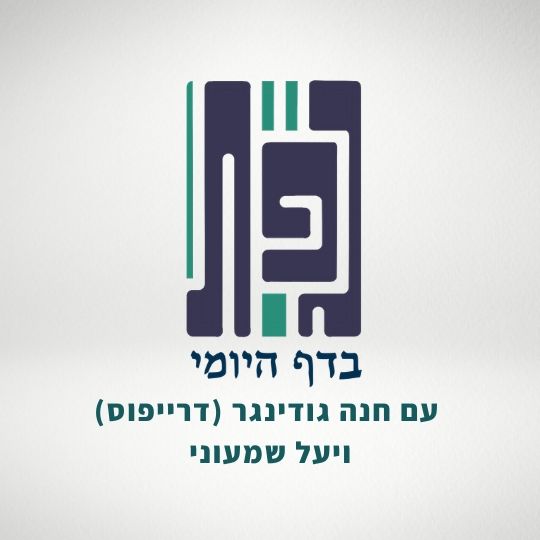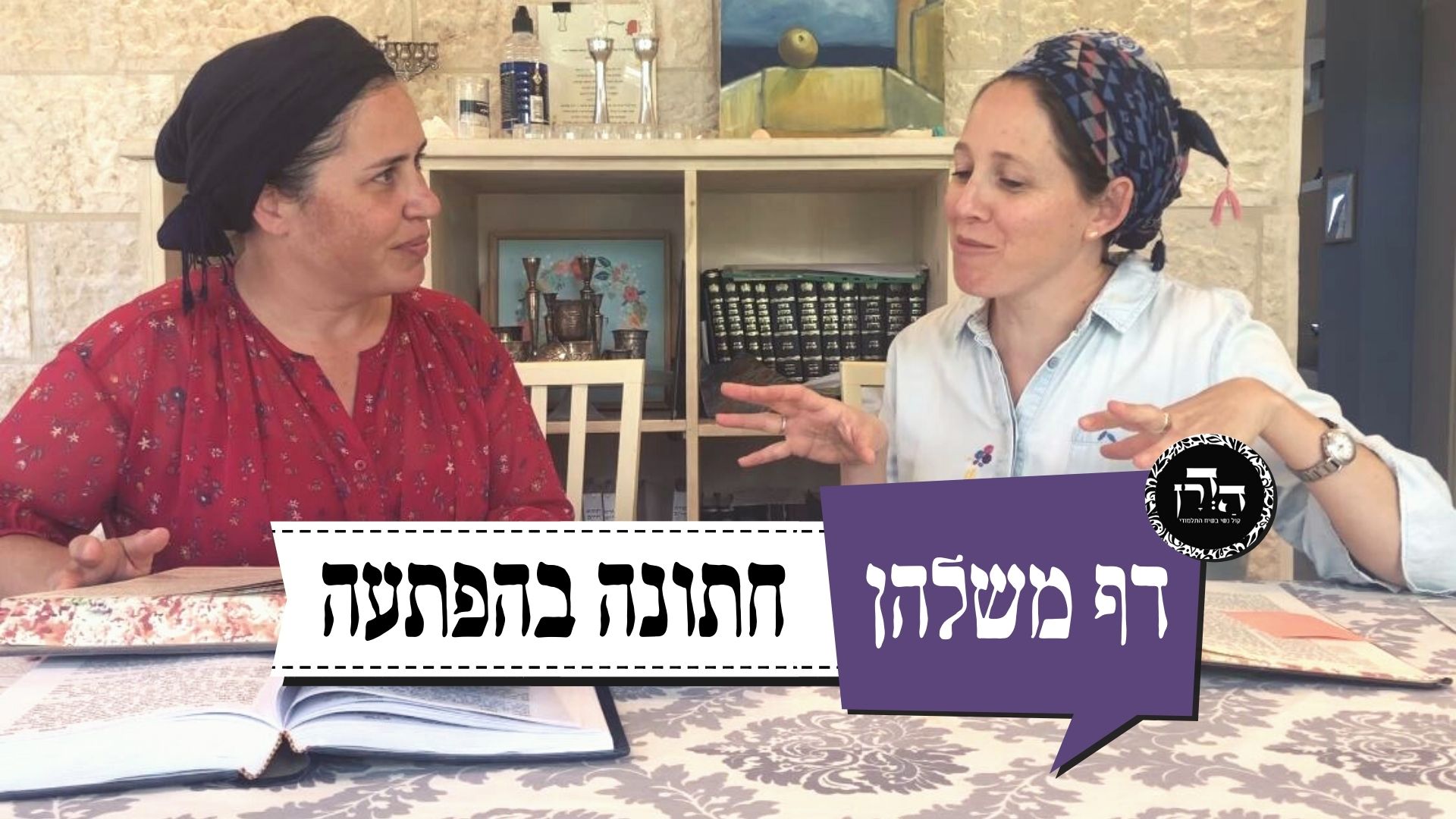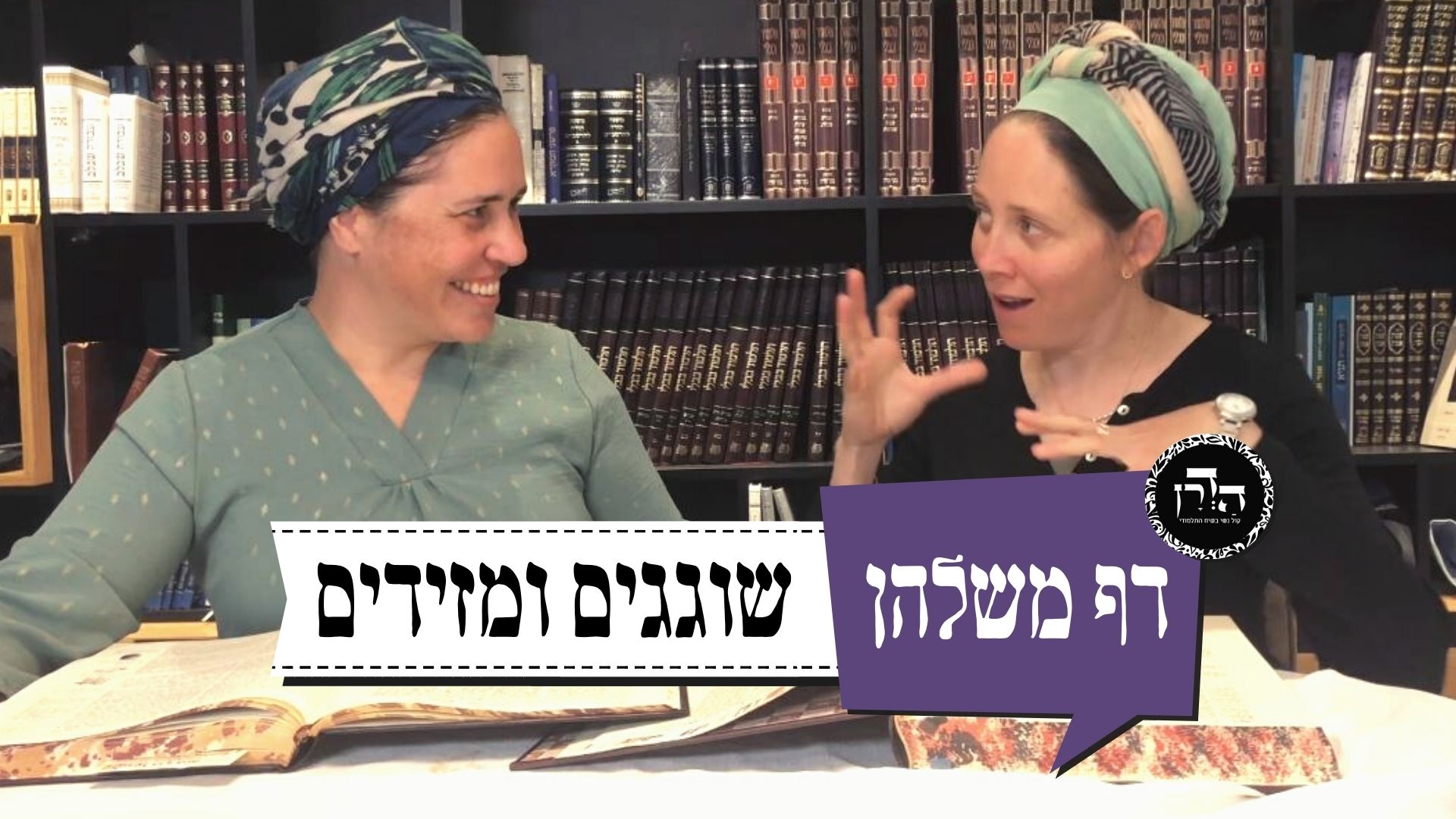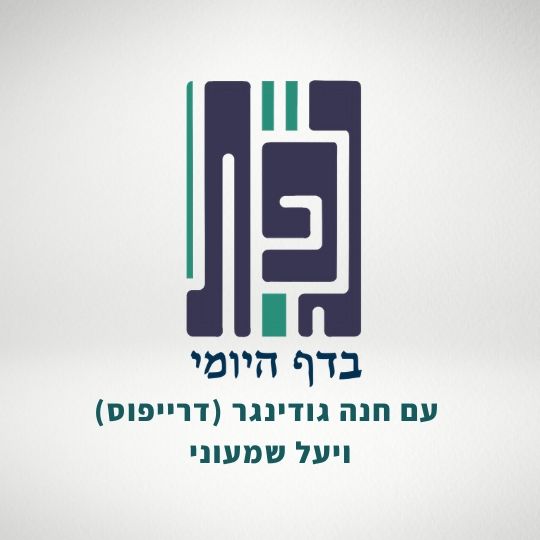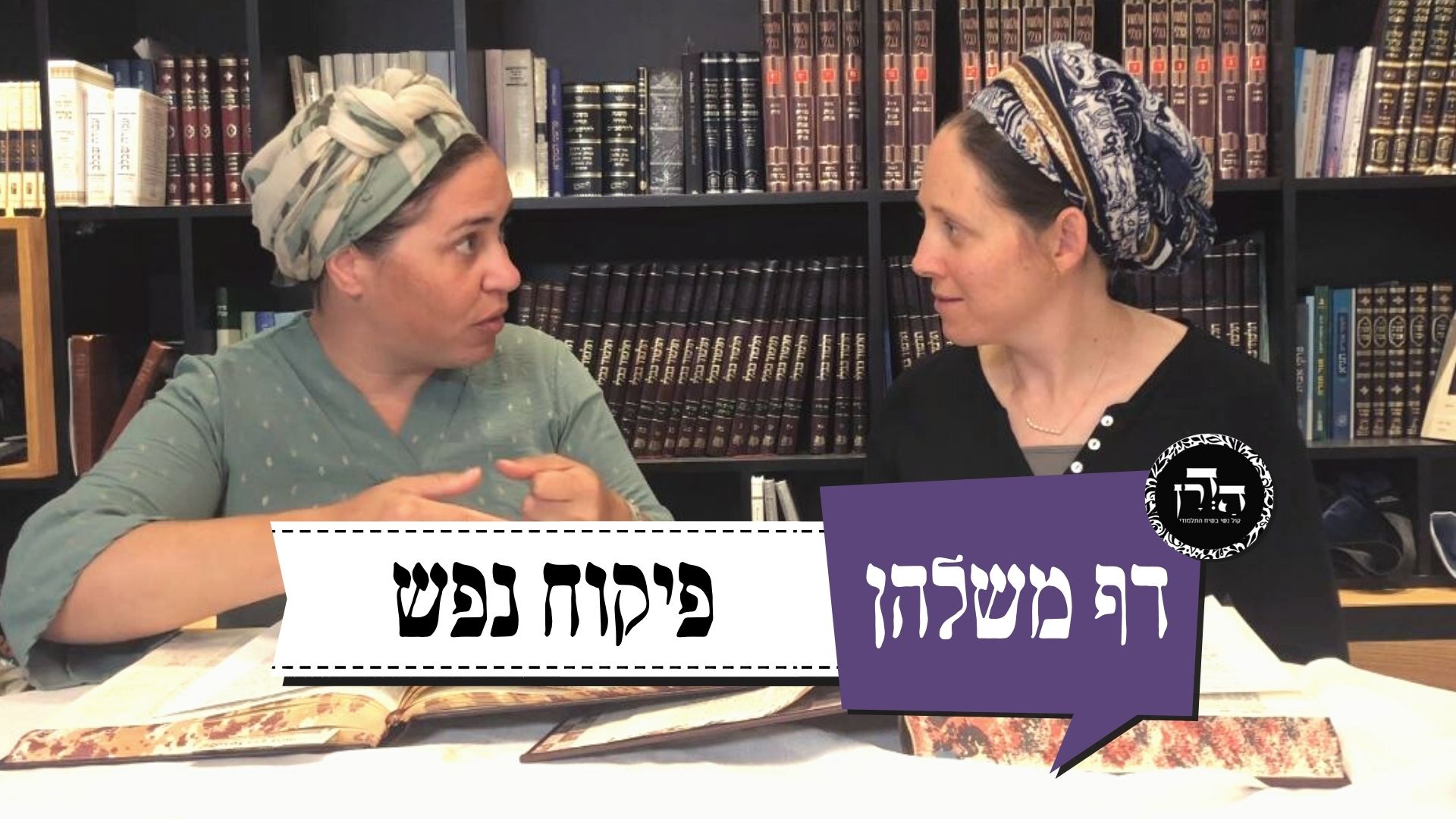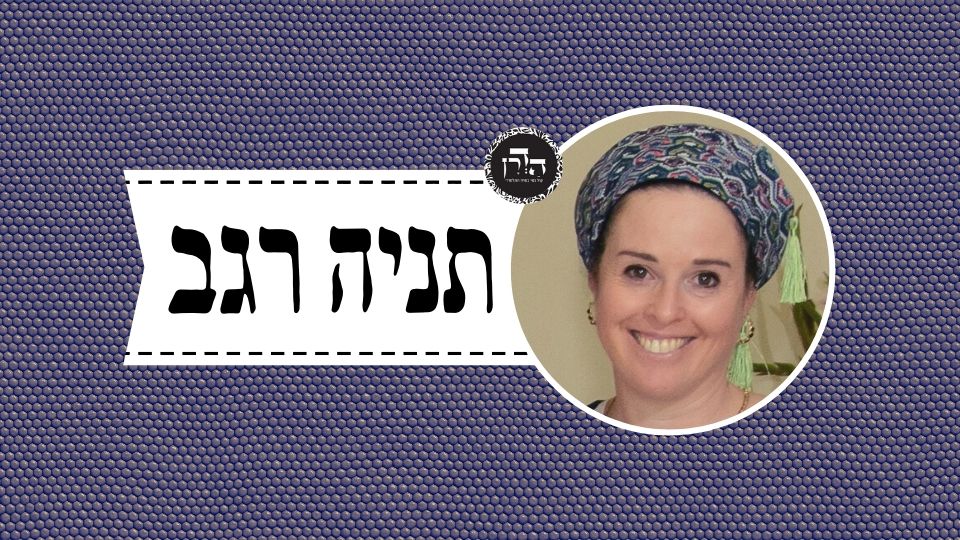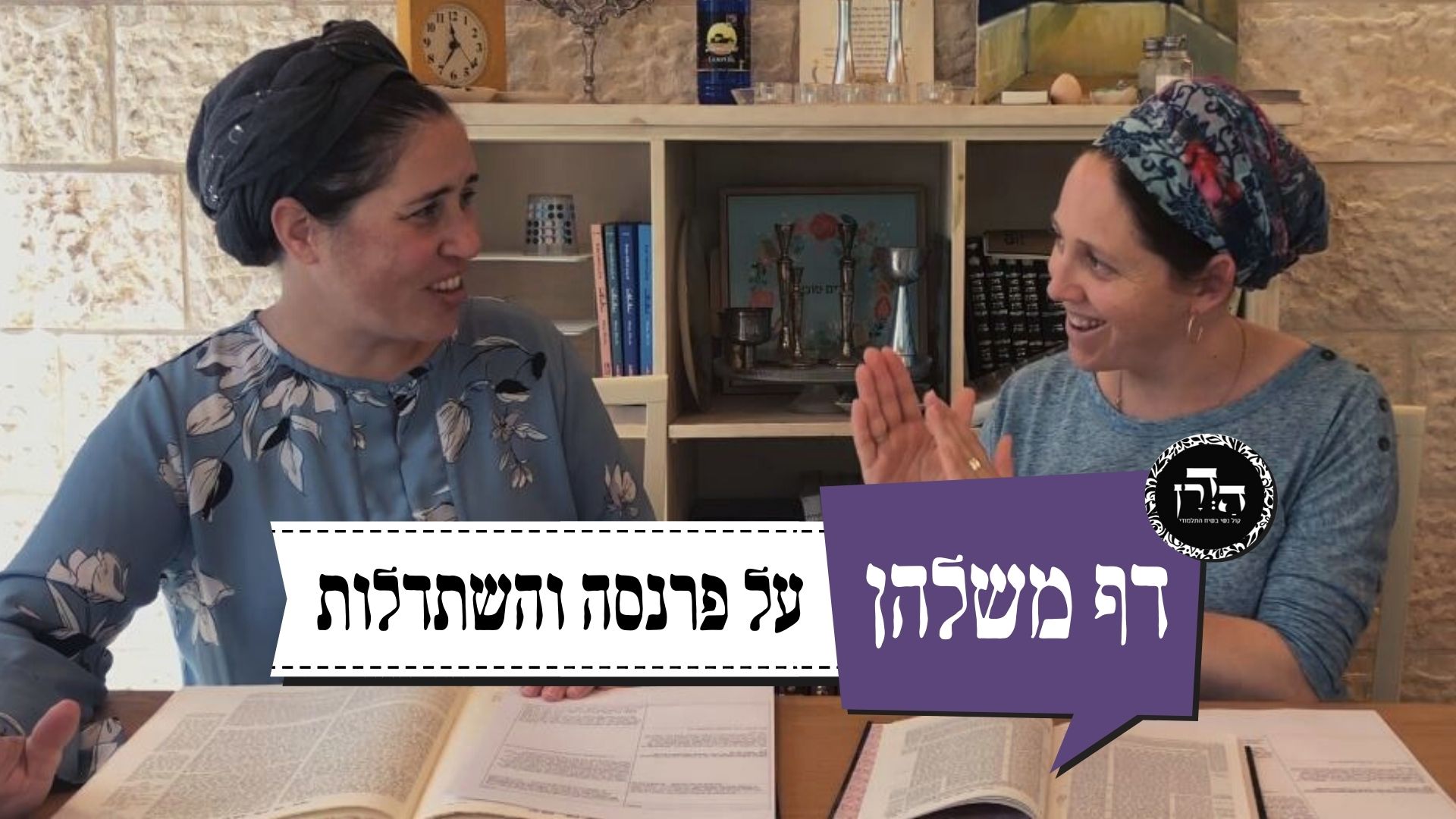ביצה כח
מַתְנִי׳ רַבִּי יְהוּדָה אוֹמֵר: שׁוֹקֵל אָדָם בָּשָׂר כְּנֶגֶד הַכְּלִי אוֹ כְּנֶגֶד הַקּוֹפִיץ. וַחֲכָמִים אוֹמְרִים: אֵין מַשְׁגִּיחִין בְּכַף מֹאזְנַיִם כׇּל עִיקָּר.
MISHNA: Rabbi Yehuda says: A person selling meat on a Festival who wishes to know its weight in order to determine its price may not weigh it against regular weights in the ordinary weekday manner, but he may weigh the meat against a vessel or against a cleaver [kofitz] and then calculate the weight of the meat by weighing the vessel or cleaver later. And the Rabbis say: One may not look at the pans of a balance scale at all, meaning that they may not be used for weighing in any manner or for any other purpose.
גְּמָ׳ מַאי ״כׇּל עִיקָּר״? אָמַר רַב יְהוּדָה אָמַר שְׁמוּאֵל: אֲפִילּוּ לְשׇׁמְרוֹ מִן הָעַכְבָּרִים. אָמַר רַב אִידִי בַּר אָבִין: וְהוּא דְּתַלְיָא בִּתְרִיטָא.
GEMARA: The Gemara asks: What is the meaning of: One may not look at the pans of a scale at all? Rav Yehuda said that Shmuel said: Even if one has meat and he wishes to protect it from mice, he may not put it on a scale, since it would look as if he were weighing it. Rav Idi bar Avin said: And this ruling applies only where the scale is hanging on the ring used for balancing it. However, if the scale is hanging in such a manner that it is not fit for weighing, one may use it as he would use any other vessel.
וְאָמַר רַב יְהוּדָה אָמַר שְׁמוּאֵל: טַבָּח אוּמָּן אָסוּר לִשְׁקוֹל בָּשָׂר בַּיָּד. וְאָמַר רַב יְהוּדָה אָמַר שְׁמוּאֵל: טַבָּח אוּמָּן אָסוּר לִשְׁקוֹל בָּשָׂר בְּמַיִם.
And Rav Yehuda said that Shmuel said: It is prohibited for an expert butcher to weigh meat on a Festival even by hand because he can arrive at its precise weight using this method, and so it is prohibited like weighing with a scale. And likewise, Rav Yehuda said that Shmuel said: It is prohibited for an expert butcher to weigh meat on a Festival even in water. Butchers would calculate the weight of a slab of meat by placing it into a tub of water and measuring the amount of water that it displaces with the help of markings on the container. Since this procedure enables the butcher to determine the precise weight of the meat, it may not be performed on a Festival.
וְאָמַר רַב חִיָּיא בַּר אָשֵׁי: אָסוּר לַעֲשׂוֹת בֵּית יָד בַּבָּשָׂר. אָמַר רָבִינָא: וּבִידָא שְׁרֵי.
And Rav Ḥiyya bar Ashi said: It is prohibited to make a hole to serve as a handle in meat on a Festival, since this is a weekday act. Ravina said: But it is permitted to make such a handle by hand, rather than with a knife or some other implement, since this is an atypical manner of making a hole.
אָמַר רַב הוּנָא: מוּתָּר לַעֲשׂוֹת סִימָן בַּבָּשָׂר, כִּי הָא דְּרַבָּה בַּר רַב הוּנָא מְחַתֵּךְ לַהּ אַתְּלָת קַרְנָתָא.
Rav Huna said: It is permitted to make a sign on meat even on a Festival, so that it not be mistaken for the meat of another person. This is like that which Rabba bar Rav Huna would do when he sent meat by means of a messenger to his house; he would cut it into triangles as a sign that the meat was his and it was fit to be eaten.
רַבִּי חִיָּיא וְרַבִּי שִׁמְעוֹן בְּרַבִּי שׁוֹקְלִין מָנָה כְּנֶגֶד מָנָה בְּיוֹם טוֹב. כְּמַאן? לָא כְּרַבִּי יְהוּדָה וְלֹא כְּרַבָּנַן! אִי כְּרַבִּי יְהוּדָה, הָאָמַר: שׁוֹקֵל אָדָם בָּשָׂר כְּנֶגֶד הַכְּלִי אוֹ כְּנֶגֶד הַקּוֹפִיץ. כְּנֶגֶד הַכְּלִי — אִין, כְּנֶגֶד מִידֵּי אַחֲרִינָא — לָא! אִי כְּרַבָּנַן, הָא אָמְרִי: אֵין מַשְׁגִּיחִין בְּכַף מֹאזְנַיִם כׇּל עִיקָּר!
The Gemara relates an incident in connection to the basic halakha of the mishna: Rabbi Ḥiyya and Rabbi Shimon, son of Rabbi Yehuda HaNasi, would weigh one portion against another portion on a Festival in order to divide the meat between them. The Gemara asks: In accordance with whose opinion did they do so? This seems to be neither in accordance with the opinion of Rabbi Yehuda nor in accordance with the opinion of the Rabbis in the mishna. As, if it is in accordance with the opinion of Rabbi Yehuda, didn’t he say: A person may weigh meat against a vessel or against a cleaver, from which it may be inferred: Against a vessel or a cleaver, yes, one may do so; but against anything else, no, he may not. And if it is in accordance with the opinion of the Rabbis, didn’t they say: One may not look at the pans of a scale at all?
אִינְהוּ דַּעֲבוּד כְּרַבִּי יְהוֹשֻׁעַ. דְּתַנְיָא, רַבִּי יְהוֹשֻׁעַ אוֹמֵר: שׁוֹקְלִין מָנָה כְּנֶגֶד מָנָה בְּיוֹם טוֹב. אֲמַר רַב יוֹסֵף: הֲלָכָה כְּרַבִּי יְהוֹשֻׁעַ, הוֹאִיל וּתְנַן בִּבְכוֹרוֹת כְּוָתֵיהּ.
The Gemara explains: Rabbi Ḥiyya and Rabbi Shimon, son of Rabbi Yehuda HaNasi, acted in accordance with the opinion of Rabbi Yehoshua. As it is taught in a baraita that Rabbi Yehoshua says: One may weigh one portion against another portion on a Festival. Rav Yosef said: The halakha is in accordance with the opinion of Rabbi Yehoshua, since we learned in a mishna in tractate Bekhorot (31a) in accordance with his opinion.
דִּתְנַן: פְּסוּלֵי הַמּוּקְדָּשִׁין — הֲנָאָתָן לַהֶקְדֵּשׁ, וְשׁוֹקְלִין מָנָה כְּנֶגֶד מָנָה בַּבְּכוֹר.
As we learned there: With regard to consecrated animals that have become disqualified because of a blemish, all the benefit that accrues from their sale belongs to the Temple treasury of consecrated property. And one may weigh one portion of meat against another portion of meat in the case of a firstborn that developed a blemish. Although the meat of a firstborn may not be sold by weight in the manner of non-sacred meat, one may weigh one portion against another portion in order to determine its price. This indicates that even in a case where it is prohibited to weigh an item in the ordinary manner, one may still weigh one portion of it against another portion.
אֲמַר לֵיהּ אַבָּיֵי: וְדִלְמָא לָא הִיא, עַד כָּאן לָא קָאָמַר רַבִּי יְהוֹשֻׁעַ הָכָא, אֶלָּא דְּלֵיכָּא בִּזְיוֹן קָדָשִׁים, אֲבָל הָתָם דְּאִיכָּא בִּזְיוֹן קֳדָשִׁים — לָא.
Abaye said to him: Perhaps that is not so, and the two cases are not similar. It is possible that Rabbi Yehoshua stated his opinion that one may weigh one portion against another only here, on a Festival, where the action does not involve a show of degradation of sacred items; but there, in the case of a firstborn, where the weighing involves a display of degradation of sacred items, perhaps he did not permit weighing of any kind.
אִי נָמֵי, עַד כָּאן לָא קָאָמְרִי רַבָּנַן הָתָם אֶלָּא מִשּׁוּם דְּלָא מִחֲזֵי כְּעוֹבָדִין דְּחוֹל, אֲבָל הָכָא דְּמִחֲזֵי כְּעוֹבָדִין דְּחוֹל — לָא.
Alternatively, it is possible that the Rabbis stated their opinion that one may weigh one portion against another only there, in the case of a firstborn, because it does not look like a weekday activity; but here, on a Festival, where it looks like a weekday activity, perhaps they would not have permitted it. It is therefore possible that even the Rabbis would prohibit this action on a Festival.
לְמֵימְרָא דְּקָפְדִי אַהֲדָדֵי? וְהָא הָנְהוּ שַׁב בִּנְיָתָא דַּאֲתוֹ לְבֵי רַבִּי, וְאִשְׁתַּכַּח חֲמֵשׁ מִנַּיְיהוּ בֵּי רַבִּי חִיָּיא, וְלָא קָפֵיד רַבִּי שִׁמְעוֹן בְּרַבִּי!
With regard to the incident involving Rabbi Ḥiyya and Rabbi Shimon, son of Rabbi Yehuda HaNasi, the Gemara asks: Is this to say that they were particular with each other with regard to such matters, to the extent that they had to weigh one portion against another so that their portions would be exactly equal? But wasn’t there the incident of the seven fish that were brought to the house of Rabbi Yehuda HaNasi, and five of them were later found in the house of Rabbi Ḥiyya, who had taken them from Rabbi Yehuda HaNasi; and Rabbi Shimon, son of Rabbi Yehuda HaNasi, was not particular about this, as they treated each other like family?
אָמַר רַב פָּפָּא, שְׁדִי גַּבְרָא בֵּינַיְיהוּ: אִי רַבִּי חִיָּיא וְרַבִּי יִשְׁמָעֵאל בְּרַבִּי יוֹסֵי, אִי רַבִּי שִׁמְעוֹן בְּרַבִּי וּבַר קַפָּרָא.
Rav Pappa said: Cast a person between them. In other words, a third party must have been involved in the incident. How so? Either the two who divided the meat between themselves were Rabbi Ḥiyya and Rabbi Yishmael, son of Rabbi Yosei, or else they were Rabbi Shimon, son of Rabbi Yehuda HaNasi and bar Kappara. Although these pairs of scholars were colleagues, they were exacting with each other in monetary matters. Consequently, they weighed one portion of meat against the other to ensure that they would each receive the same amount.
מַתְנִי׳ אֵין מַשְׁחִיזִין אֶת הַסַּכִּין בְּיוֹם טוֹב, אֲבָל מַשִּׂיאָהּ עַל גַּבֵּי חֲבֶרְתָּהּ.
MISHNA: One may not sharpen a knife on a Festival in the ordinary weekday manner. However, one may do so in an unusual fashion, e.g., to run one knife over another, thereby sharpening the blade.
גְּמָ׳ אָמַר רַב הוּנָא: לֹא שָׁנוּ אֶלָּא בְּמַשְׁחֶזֶת שֶׁל אֶבֶן, אֲבָל בְּמַשְׁחֶזֶת שֶׁל עֵץ — מוּתָּר. אָמַר רַב יְהוּדָה אָמַר שְׁמוּאֵל: הָא דְּאָמְרַתְּ שֶׁל אֶבֶן אָסוּר, לָא אֲמַרַן אֶלָּא לְחַדְּדָהּ, אֲבָל לְהַעֲבִיר שַׁמְנוּנִיתָהּ — מוּתָּר. מִכְּלָל דִּבְשֶׁל עֵץ — אֲפִילּוּ לְחַדְּדָהּ, נָמֵי מוּתָּר.
GEMARA: Rav Huna said: They taught that one may not sharpen a knife on a Festival only if he does so in the typical manner, with a stone knife sharpener, but if he does so with a wooden knife sharpener, it is permitted, as this is an unusual way of sharpening knives. Rav Yehuda said that Shmuel said: With regard to that which you said, that a stone sharpener is prohibited, we said this only where one’s intention is to sharpen the knife, but if he merely means to remove the accumulated fat by scraping it off with the stone, it is permitted. This proves by inference that with a sharpener made of wood, even if his intention is to sharpen the knife, it is permitted.
אִיכָּא דְּמַתְנֵי לַהּ אַסֵּיפָא: בְּשֶׁל עֵץ מוּתָּר, אָמַר רַב יְהוּדָה אָמַר שְׁמוּאֵל: הָא דְּאָמְרַתְּ בְּשֶׁל עֵץ מוּתָּר, לָא אֲמַרַן אֶלָּא לְהַעֲבִיר שַׁמְנוּנִיתָהּ, אֲבָל לְחַדְּדָהּ — אָסוּר. מִכְּלָל דִּבְשֶׁל אֶבֶן — אֲפִילּוּ לְהַעֲבִיר שַׁמְנוּנִיתָהּ אָסוּר.
Some teach the statement of Rav Yehuda as referring to the latter clause of Rav Huna’s statement, where he says: But if he uses a sharpener made of wood, it is permitted. Rav Yehuda said that Shmuel said: With regard to that which you said, that with a wooden sharpener it is permitted, we said this only where one’s intention is to remove its fat, but if he does so in order to sharpen it, it is prohibited. This proves by inference that with a sharpener made of stone, even if he intended merely to remove its fat, it is prohibited.
אִיכָּא דְּמַתְנֵי לַהּ אַמַּתְנִיתִין: אֵין מַשְׁחִיזִין אֶת הַסַּכִּין בְּיוֹם טוֹב, אֲמַר רַב יְהוּדָה אָמַר שְׁמוּאֵל: לֹא שָׁנוּ אֶלָּא לְחַדְּדָהּ, אֲבָל לְהַעֲבִיר שַׁמְנוּנִיתָהּ — מוּתָּר, מִכְּלָל דְּעַל גַּבֵּי חֲבֶרְתָּהּ — אֲפִילּוּ לְחַדְּדָהּ, נָמֵי מוּתָּר.
Some teach the statement of Rav Yehuda as referring to the mishna itself, which teaches: One may not sharpen a knife on a Festival. Rav Yehuda said that Shmuel said: They taught that this is prohibited only where one’s intention is to sharpen the knife, but if his aim is merely to remove its fat, it is permitted. This proves by inference that running one knife over another is permitted even if his intention is to sharpen the knife.
וְאִיכָּא דְּמַתְנֵי לַהּ אַסֵּיפָא: אֲבָל מַשִּׂיאָהּ עַל גַּבֵּי חֲבֶרְתָּהּ, אָמַר רַב יְהוּדָה אָמַר שְׁמוּאֵל: לֹא שָׁנוּ אֶלָּא לְהַעֲבִיר שַׁמְנוּנִיתָהּ, אֲבָל לְחַדְּדָהּ — אָסוּר. מִכְּלָל דִּבְמַשְׁחֶזֶת — אֲפִילּוּ לְהַעֲבִיר שַׁמְנוּנִיתָהּ אָסוּר.
And some teach the statement of Rav Yehuda as referring to the latter clause of the mishna, which teaches: However, one may run one knife over another. Rav Yehuda said that Shmuel said: They taught this only where one’s intention is to remove its fat, but if he does so to sharpen it, it is prohibited. This proves by inference that with a sharpener, it is prohibited even to remove its fat.
מַאן תַּנָּא דִּבְמַשְׁחֶזֶת אָסוּר? אָמַר רַב חִסְדָּא: דְּלָא כְּרַבִּי יְהוּדָה. דְּתַנְיָא: אֵין בֵּין יוֹם טוֹב לַשַּׁבָּת אֶלָּא אוֹכֶל נֶפֶשׁ בִּלְבָד. רַבִּי יְהוּדָה מַתִּיר אַף מַכְשִׁירֵי אוֹכֶל נֶפֶשׁ.
The Gemara asks: Who is the tanna who holds that with a sharpener it is entirely prohibited? Rav Ḥisda said: This tanna does not hold in accordance with the opinion of Rabbi Yehuda, as it is taught in a baraita: The difference between a Festival and Shabbat is only with regard to the preparation of food, as it is permitted to perform labor for the purpose of food preparation on a Festival, but not on Shabbat; Rabbi Yehuda permits even actions that facilitate preparation of food on a Festival, e.g., repairing utensils with which food is prepared on the Festival.
אֲמַר לֵיהּ רָבָא לְרַב חִסְדָּא: דָּרְשִׁינַן מִשְּׁמָךְ הֲלָכָה כְּרַבִּי יְהוּדָה. אֲמַר לֵיהּ: יְהֵא רַעֲוָא דְּכׇל כִּי הָנֵי מִילֵּי מְעַלְּיָיתָא תִּדְרְשׁוּן מִשְּׁמַאי.
Rava said to Rav Ḥisda: We teach in your name that the halakha is in accordance with the opinion of Rabbi Yehuda. He said to him: May it be God’s will that you teach in my name all outstanding matters like this. In other words, Rav Ḥisda was pleased that this teaching was attributed to him, as he too agreed with it.
אָמַר רַב נְחֶמְיָה בְּרֵיהּ דְּרַב יוֹסֵף: הֲוָה קָאֵימְנָא קַמֵּיהּ דְּרָבָא, וַהֲוָה קָא
The Gemara relates that Rav Neḥemya, son of Rav Yosef, said: I was once standing before Rava, and he was
מְעַבַּר לְסַכִּינָא אַפּוּמָּא דְּדִקּוּלָא, וְאָמְרִי לֵיהּ: לְחַדְּדָהּ קָא עָבֵיד מָר, אוֹ לְהַעֲבִיר שַׁמְנוּנִיתָהּ? וְאָמַר לִי: לְהַעֲבִיר שַׁמְנוּנִיתָהּ. וַחֲזֵיתִי לְדַעְתֵּיהּ דִּלְחַדְּדָהּ קָא עָבֵיד, וְקָסָבַר: הֲלָכָה, וְאֵין מוֹרִין כֵּן.
running a knife over the rim of a basket on a Festival. And I said to him: Is the Master doing so in order to sharpen it or in order to remove its fat? And he said to me: To remove its fat. And I nevertheless perceived his intention, that he did so in order to sharpen it. He concealed this from me, however, because he holds that Rabbi Yehuda’s opinion is the halakha but a public ruling is not issued to that effect; therefore he did not wish to permit the practice explicitly.
וְאָמַר אַבָּיֵי: הֲוָה קָאֵימְנָא קַמֵּיהּ דְּמָר, וַהֲוָה קָא מְעַבַּר סַכִּינָא אַשִּׂפְתָּא דְרִחְיָא. וַאֲמַרִי לֵיהּ: לְחַדְּדָהּ קָא בָּעֵי מָר, אוֹ לְהַעֲבִיר שַׁמְנוּנִיתָהּ? וְאָמַר לִי: לְהַעֲבִיר שַׁמְנוּנִיתָהּ. וַחֲזִיתִי לְדַעְתֵּיהּ דִּלְחַדְּדָהּ קָא עָבֵיד, וְקָסָבַר: הֲלָכָה, וְאֵין מוֹרִין כֵּן.
Similarly, Abaye said: I was standing before my Master and teacher, Rabba, and he was running a knife over the edge of a millstone on a Festival. And I said to him: Does the Master wish to sharpen it, or is he doing this in order to remove its fat? And he said to me: To remove its fat. And I perceived his intention, that he did so in order to sharpen it, but he holds: This is the halakha, but a public ruling is not issued to that effect.
אִיבַּעְיָא לְהוּ: מַהוּ לְהַרְאוֹת סַכִּין לְחָכָם בְּיוֹם טוֹב? רַב מָרִי בְּרֵיהּ דְּרַב בִּיזְנָא שָׁרֵי, וְרַבָּנַן אָסְרִי. וְרַב יוֹסֵף אָמַר: תַּלְמִיד חָכָם רוֹאֶה לְעַצְמוֹ, וּמַשְׁאִילָהּ לַאֲחֵרִים.
A dilemma was raised before the Sages: What is the halakha with regard to showing a slaughtering knife to a Sage on a Festival so that he may examine it for nicks and imperfections that would render it unfit to be used for slaughtering? Rav Mari, son of Rav Bizna, permitted it, whereas the Rabbis prohibited it, as this is somewhat similar to a weekday activity. And Rav Yosef said: A Torah scholar may examine a knife for himself in his own home and then lend it to others, who may also slaughter with it. Since the examination is not performed in public, it does not appear similar to a weekday activity.
וְאָמַר רַב יוֹסֵף: סַכִּין שֶׁעָמְדָה — מוּתָּר לְחַדְּדָהּ בְּיוֹם טוֹב. וְהָנֵי מִילֵּי הוּא דְּפָסְקָא אַגַּב דּוּחְקָא.
§ And Rav Yosef said: With regard to a knife that became blunt without being nicked, it is permitted to sharpen it on a Festival. And this applies only if the knife still cuts, albeit with difficulty, so that when he sharpens it he is seen not as making a new utensil but merely as improving an old one. However, if the knife no longer cuts at all, it is prohibited to sharpen it.
דָּרַשׁ רַב חִסְדָּא, וְאִיתֵּימָא רַב יוֹסֵף: אֶחָד סַכִּין שֶׁנִּפְגְּמָה, וְאֶחָד שַׁפּוּד שֶׁנִּרְצַם, וְאֶחָד גְּרִיפַת תַּנּוּר וְכִירַיִם בְּיוֹם טוֹב — בָּאנוּ לְמַחְלוֹקֶת רַבִּי יְהוּדָה וְרַבָּנַן. דְּתַנְיָא: אֵין בֵּין יוֹם טוֹב לַשַּׁבָּת אֶלָּא אוֹכֶל נֶפֶשׁ בִּלְבָד. רַבִּי יְהוּדָה מַתִּיר אַף מַכְשִׁירֵי אוֹכֶל נֶפֶשׁ.
Rav Ḥisda taught, and some say it was Rav Yosef who taught: A knife that became nicked on a Festival, a roasting skewer [shappud] that was crushed on a Festival and its point broke off, and the sweeping of the coals in an oven and a stove on a Festival to prepare them for baking, with regard to all of these we have arrived at the dispute between Rabbi Yehuda and the Rabbis. As it is taught in a baraita: The difference between a Festival and Shabbat is only with regard to the preparation of food. Rabbi Yehuda permits even actions that facilitate preparation of food on a Festival.
מַאי טַעְמָא דְּתַנָּא קַמָּא — אָמַר קְרָא: ״הוּא לְבַדּוֹ יֵעָשֶׂה לָכֶם״. ״הוּא״ — וְלֹא מַכְשִׁירָיו. וְרַבִּי יְהוּדָה, אָמַר קְרָא: ״לָכֶם״, לָכֶם — לְכׇל צׇרְכֵיכֶם.
The Gemara explains: What is the reason of the first tanna for prohibiting actions that facilitate food preparation? The verse states: “Save that which every person must eat, that alone may be done for you” (Exodus 12:16), from which it may be inferred: “That” may be done on a Festival, but not actions that facilitate it. And Rabbi Yehuda adduces proof for his view from the fact that the verse states: “For you,” indicating: For you, for all your needs, and that which facilitates food preparation is also a need.
וְתַנָּא קַמָּא, הָא כְּתִיב ״לָכֶם״? אָמַר לָךְ: הַהוּא, ״לָכֶם״ — וְלֹא לְגוֹיִם.
The Gemara asks: And according to the first tanna, is it not written “for you”? What does he learn from this phrase? The Gemara answers: That tanna could have said to you that that phrase comes to teach: For you, but not for gentiles.
וְאִידַּךְ נָמֵי, הָא כְּתִיב ״הוּא״, אָמַר לָךְ: כְּתִיב ״הוּא״, וּכְתִיב ״לָכֶם״, וְלָא קַשְׁיָא: כָּאן בְּמַכְשִׁירִין שֶׁאֶפְשָׁר לַעֲשׂוֹתָן מֵעֶרֶב יוֹם טוֹב, כָּאן בְּמַכְשִׁירִין שֶׁאִי אֶפְשָׁר לַעֲשׂוֹתָן מֵעֶרֶב יוֹם טוֹב.
The Gemara asks: And according to the other tanna, Rabbi Yehuda, too, isn’t it written: “That,” which indicates a limitation? The Gemara explains that Rabbi Yehuda could have said to you: The limiting word “that” is written, and the expansive phrase “for you,” indicating all your needs, is written as well, but this is not difficult and no contradiction is involved. One can say that here, it is referring to actions that facilitate food preparation that can be performed on the eve of the Festival; the Torah prohibits these on a Festival. There, it is referring to actions that facilitate food preparation that cannot be performed on the eve of the Festival. The latter may be performed even on the Festival itself, as they too are part of the preparation of food, similar to cooking.
אָמַר רַב יְהוּדָה אָמַר שְׁמוּאֵל: שַׁפּוּד שֶׁנִּרְצַף — אָסוּר לְתַקְּנוֹ בְּיוֹם טוֹב. פְּשִׁיטָא! לָא צְרִיכָא, דְּאַף עַל גַּב דְּמִפְּשִׁיט בִּידֵיהּ.
Rav Yehuda said that Shmuel said: With regard to a roasting skewer that became bent, it is prohibited to repair it on a Festival. The Gemara asks: This is obvious; it is clear that one may not fix a utensil on a Festival. The Gemara answers: No, it is necessary to state this halakha with regard to a particular case: Although the skewer can be straightened by hand and no special tool is needed for this task, it is nevertheless prohibited.
וְאָמַר רַב יְהוּדָה אָמַר שְׁמוּאֵל: שַׁפּוּד שֶׁצָּלוּ בּוֹ בָּשָׂר — אָסוּר לְטַלְטְלוֹ בְּיוֹם טוֹב. רַב אַדָּא בַּר אַהֲבָה אָמַר רַב מַלְכִּיּוֹ: שׁוֹמְטוֹ וּמַנִּיחוֹ בְּקֶרֶן זָוִית.
And Rav Yehuda said that Shmuel said: With regard to a skewer upon which one roasted meat, it is prohibited to move it on a Festival, as it has already served its purpose on the Festival, and it is not fit for any other use. Rav Adda bar Ahava said that Rav Malkiyu said: He may pull the skewer out and place it in a corner so that it will not endanger anyone, as it could if it were left in the middle of the house.
אָמַר רַב חִיָּיא בַּר אָשֵׁי אָמַר רַב הוּנָא: וְהוּא שֶׁיֵּשׁ עָלָיו כְּזַיִת בָּשָׂר. רָבִינָא אָמַר: אַף עַל פִּי שֶׁאֵין עָלָיו בָּשָׂר — מוּתָּר לְטַלְטְלוֹ, מִידֵּי דְּהָוֵה אַקּוֹץ בִּרְשׁוּת הָרַבִּים.
Rav Ḥiyya bar Ashi said that Rav Huna said: And this ruling applies only where the skewer has an olive-bulk of meat on it; in such a case he may move the skewer on account of the meat and drag it into the corner in an unusual manner. However, if it does not have an olive-bulk of meat on it, he may not move it at all. Ravina said: Although it does not have an olive-bulk of meat on it, it is permitted to move it in the regular manner and place it in a corner, just as in the case of a thorn lying in the public domain. For the sake of public safety, it is permitted to remove such a thorn by moving it in increments, each less than four cubits. The same applies to this skewer; since it might harm someone where it is, it may be moved to a corner.
אָמַר רַב חִינָּנָא בְּרֵיהּ דְּרַב אִיקָא: שַׁפּוּד, שְׁפָחוֹת, וְגוּמוֹת — רַב מַלְכִּיּוֹ.
Apropos Rav Malkiyu, to whom only a few halakhot are attributed, the Gemara mentions that Rav Ḥinnana, son of Rav Ika, said: The halakha with regard to a skewer that had been used for roasting meat but no longer has an olive-bulk of meat on it, that it may be moved to a corner; and likewise, the halakha concerning maidservants, that even if a woman brought one hundred maidservants into the marriage as her dowry, her husband may nevertheless compel her to perform some sort of work so that her boredom not bring her to sin (Ketubot 61b); and finally, the halakha with regard to follicles, that if a girl has two hair follicles in her pubic region, even if there are no hairs growing from them, she is considered to have reached majority and may perform ḥalitza; these three halakhot were all stated by Rav Malkiyu.
בְּלוֹרִית, אֵפֶר מִקְלֶה, וּגְבִינָה — רַב מַלְכִּיָּא.
However, the halakha concerning a forelock, that a Jew who cuts the hair of a gentile must stop before he reaches his forelock at a distance of three fingerbreadths on every side, as the gentiles would grow their forelocks for idolatry, and the Jew must not appear as if he were dressing the forelock for idolatrous purposes; and likewise, the halakha concerning burnt ashes, that one may not place them on a wound, as it looks like a tattoo; and finally, the halakha with regard to cheese made by a gentile, that it is forbidden because gentiles smooth the surface of their cheese with lard; these three halakhot were all stated by a different Sage named Rav Malkiya.
רַב פָּפָּא אָמַר: מַתְנִיתִין וּמַתְנִיתָא — רַב מַלְכִּיָּא. שְׁמַעְתָּתָא — רַב מַלְכִּיּוֹ. וְסִימָנָיךְ: מַתְנִיתִין מַלְכְּתָא. מַאי בֵּינַיְיהוּ? אִיכָּא בֵּינַיְיהוּ שְׁפָחוֹת.
Rav Pappa said a different principle: The teachings mentioned above that relate to a mishna or a baraita were stated by Rav Malkiya, whereas halakhot that are not related to a mishna or baraita were taught by Rav Malkiyu. And your mnemonic to remember this is: The mishna is a queen [malketa]; the comments that are referring to a mishna were made by Rav Malkiya, whose name is similar to the Aramaic term for queen. The Gemara asks: What is the practical difference between Rav Ḥinnana and Rav Pappa? The Gemara answers: There is a practical difference between them with regard to the halakha concerning maidservants. According to Rav Ḥinnana, this halakha was stated by Rav Malkiyu, whereas Rav Pappa holds that it was taught by Rav Malkiya, since it is referring to a dispute in a mishna.
מַתְנִי׳ לֹא יֹאמַר אָדָם לַטַּבָּח: שְׁקוֹל לִי בְּדִינָר בָּשָׂר, אֲבָל שׁוֹחֵט וּמְחַלֵּק בֵּינֵיהֶם.
MISHNA: A person may not say to a butcher on a Festival: Weigh for me a dinar’s worth of meat, since if he mentions a sum of money, it looks like a commercial transaction. But the butcher may slaughter an animal and apportion it among his customers without stipulating a price.
גְּמָ׳ הֵיכִי עָבֵיד? כִּי הָא
GEMARA: The Gemara asks: What should one do if he wishes to take part of an animal on a Festival, but is barred from mentioning its price? The Gemara answers: As

